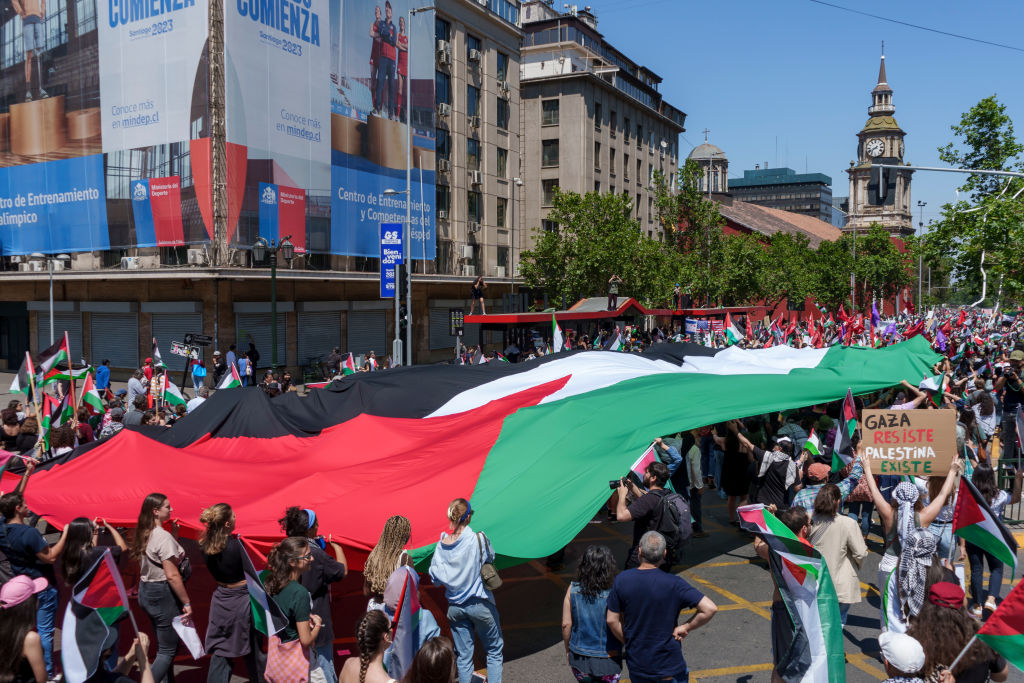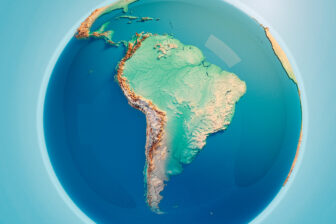SÃO PAULO—While Latin America has the privilege of being far away from the world’s geopolitical hotspots, the region has not escaped the global polarization unleashed by war between Israel and Hamas, producing a heated and increasingly venomous public debate. That is partly because, in numerous countries, divisions over the conflict in the Middle East fall largely along domestic partisan lines—contrary to the war in Ukraine, where left and right hold largely similar positions.
On a number of basic issues regarding the conflict, the left and the right tend to agree: The vast majority of policymakers condemned the attacks committed by Hamas on October 7 (with the exception of Cuba, Nicaragua and Venezuela). Most Latin American countries, irrespective of the ideological orientation of their government, also diplomatically recognize the state of Palestine, and unlike much of Europe and the U.S., most have not designated Hamas a terrorist organization (though numerous Latin American governments, such as Brazil, Argentina, Uruguay, Colombia, Guatemala and Ecuador have described the October 7 attacks as “terrorism”).
Yet this is where the agreement ends. Brazil is a case in point: Numerous supporters of former President Jair Bolsonaro, whose government made strengthening ties to the Netanyahu government a priority, include an Israeli flag in their handles on X (formerly Twitter), and Bolsonaro has been highly supportive of Israel since the beginning of the war. Brazil’s Workers’ Party (PT), on the other hand, has long been sympathetic to Palestine, and numerous high-ranking officials in the Lula government have strongly criticized Netanyahu’s response to the attacks by Hamas on October 7, while the PT has passed a resolution accusing Israel of committing “genocide.”
While Lula has condemned the attacks by Hamas and used the word “terrorism,” he has also expressed concern about mounting civilian deaths in Gaza (and recently argued Israel’s response was “as grave” as the Hamas attack). Brazil-Israel ties have recently become strained after former President Bolsonaro attended a meeting with Israel’s ambassador, and after Israel leaked information about the Brazilian police’s operation to take down a suspected Hezbollah cell preparing terrorist attacks, occasioning a public rebuke by Brazil’s justice minister.
In Argentina, far-right presidential candidate Javier Milei, who has promised to move the country’s embassy in Israel to Jerusalem (something Bolsonaro also promised, though in the end he only opened a trade office there), has voiced strong support for Israel. After unequivocally condemning the Hamas attacks on October 7, the current left-of-center government in Argentina has adopted an attitude increasingly critical of Israel’s attacks on Gaza. The foreign ministry noted, after an attack on a refugee camp in early November, that “nothing justifies the violation of international humanitarian law and the obligation to protect the civilian population in armed conflicts.” This position has been sharply criticized by DAIA, an umbrella organization representing Argentina’s Jewish community. In Argentina, home to the largest Jewish population in Latin America—numbering approximately 200,000—the conflict brought to the fore memories of terrorist attacks, including against a Jewish community center in 1994, which killed 85 and injured more than 300, and which is widely thought to have been perpetrated by Hezbollah. Among those still missing and thought to be held hostage by Hamas in Gaza are 21 Argentine citizens, more than from any other Latin American country.
Chile’s President Gabriel Boric, generally known for his principled diplomatic positions—he roundly condemned Russia’s invasion of Ukraine and is the only leftist Latin American leader who does not shy away from explicitly criticizing leftist dictators such as Venezuela’s Nicolás Maduro—recalled Chile’s ambassador to Israel on October 31 and denounced Israel’s “unacceptable violations of international humanitarian law.” Boric’s stance has been fiercely opposed by far-right opposition leader José Antonio Kast, who said Hamas would “celebrate” Chile’s position. Chile is home to the largest Palestinian diaspora outside of the Middle East.
Events have been decidedly more turbulent and equally polarized in Colombia, where leftist President Gustavo Petro has shared numerous posts on social media highly critical of Israel, accused the country of committing “genocide” and caused an uproar when he compared the Gaza Strip to the Warsaw Ghetto and Israel to Nazi Germany. Petro’s stance has led Israel to suspend defense cooperation with Colombia and led twelve former Colombian ministers of foreign affairs to publish a letter accusing Petro of “radically breaking with [Colombia’s] tradition of respecting international law.” Colombia’s government recalled its ambassador in Tel Aviv.
Two days later, Honduras followed suit. Bolivia went further still and severed diplomatic ties to Israel.
In Mexico, President López Obrador has taken a hands-off stance on the conflict, typical of his overall foreign policy approach, and ruled out severing diplomatic ties to Israel, or taking “a position beyond calling for peace”—yet at the UN, the country has severely criticized the Netanyahu government for its military strategy.
Right-wing governments, conversely, have shown greater support for Netanyahu. Paraguay, one of the few Latin American countries that designates Hamas a terrorist organization, has been one of the region’s staunchest supporters of Israel, and recently announced that it would open its embassy in Jerusalem. Along with Guatemala, Panama and Ecuador, all governed by right-wing governments, Paraguay was one of the few countries not to vote in favor of a UN General Assembly resolution against Israeli settlement in the occupied Palestinian territories, which a majority of countries around the world considers illegal. Uruguay has also abstained from two important UNGA resolutions that criticized Israel.
After diverging positions vis-à-vis Ukraine between Latin America and NATO members have already caused considerable friction in bilateral relationships between them—most visibly at this year’s CELAC Summit in Brussels—the current conflict between Israel and Hamas thus risks driving another wedge between Latin American “pink tide” leaders and many of their peers from Europe and the United States.








